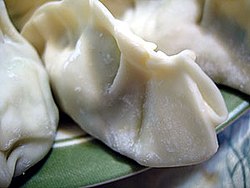餃子
Appearance
See also: 饺子
Chinese
[edit]| dumplings with meat filling | child; son; (noun suffix) child; son; (noun suffix); small thing; seed; egg; 1st earthly branch; 11 p.m.–1 a.m., midnight | ||
|---|---|---|---|
| trad. (餃子) | 餃 | 子 | |
| simp. (饺子) | 饺 | 子 | |
Etymology
[edit]Pronunciation
[edit]- Mandarin
- (Standard)
- (Chengdu, Sichuanese Pinyin): jiao3 zi3-2
- (Dungan, Cyrillic and Wiktionary): җёзы (ži͡ozɨ, II-I)
- Cantonese
- (Guangzhou–Hong Kong, Jyutping): gaau2 zi2
- (Taishan, Wiktionary): gau2 du2
- Gan (Wiktionary): jieu3 zi
- Jin (Wiktionary): jiau3 zeh
- Wu (Shanghai, Wugniu): 5ciau-tsy5; 1ciau-tsy5
- Xiang
- (Changsha, Wiktionary): jiau3 zr
- (Hengyang, Wiktionary): jiau3 zr
- Mandarin
- (Standard Chinese)
- Hanyu Pinyin:
- Zhuyin: ㄐㄧㄠˇ ˙ㄗ
- Tongyong Pinyin: jiǎozi̊h
- Wade–Giles: chiao3-tzŭ5
- Yale: jyǎu-dz
- Gwoyeu Romatzyh: jeau.tzy
- Palladius: цзяоцзы (czjaoczy)
- Sinological IPA (key): /t͡ɕi̯ɑʊ̯²¹⁴ d͡z̥z̩⁴/
- Homophones:
[Show/Hide] 角子
餃子 / 饺子
- (Chengdu)
- Sichuanese Pinyin: jiao3 zi3-2
- Scuanxua Ladinxua Xin Wenz: giaoz
- Sinological IPA (key): /t͡ɕiau⁵³ t͡sz̩⁵³⁻²¹/
- (Dungan)
- Cyrillic and Wiktionary: җёзы (ži͡ozɨ, II-I)
- Sinological IPA (key): /t͡ɕiɔː⁵¹ t͡sz̩²⁴/
- (Note: Dungan pronunciation is currently experimental and may be inaccurate.)
- (Standard Chinese)
- Cantonese
- (Standard Cantonese, Guangzhou–Hong Kong)+
- Jyutping: gaau2 zi2
- Yale: gáau jí
- Cantonese Pinyin: gaau2 dzi2
- Guangdong Romanization: gao2 ji2
- Sinological IPA (key): /kaːu̯³⁵ t͡siː³⁵/
- (Taishanese, Taicheng)
- Wiktionary: gau2 du2
- Sinological IPA (key): /kau⁵⁵ tu⁵⁵/
- (Standard Cantonese, Guangzhou–Hong Kong)+
- Gan
- (Nanchang)
- Wiktionary: jieu3 zi
- Sinological IPA (key): /t͡ɕiɛu²¹³⁻²¹ t͡sz̩¹/
- (Nanchang)
- Jin
- (Taiyuan)+
- Wiktionary: jiau3 zeh
- Sinological IPA (old-style): /t͡ɕiau⁴⁵ t͡səʔ⁴/
- (Taiyuan)+
- Wu
- Xiang
- (Changsha)
- Wiktionary: jiau3 zr
- Sinological IPA (key): /t͡ɕi̯ɒu̯⁴¹ t͡sz̩³/
- (Hengyang)
- Wiktionary: jiau3 zr
- Sinological IPA (key): /t͡ɕi̯ɑʊ̯³³ t͡sz̩³/
- (Changsha)
Noun
[edit]餃子
- crescent-shaped dumpling; jiaozi; gyoza
- (dialectal) wonton (Chinese dumpling stuffed with meat or seafood and vegetables)
Synonyms
[edit]- (jiaozi):
Dialectal synonyms of 餃子 (“jiaozi dumpling”) [map]
- (wonton):
Hyponyms
[edit]Derived terms
[edit]Descendants
[edit]- → English: jiaozi
- → French: jiaozi
- → Japanese: 餃子 (gyōza)
- → English: gyoza
- → Russian: цзя́оцзы (czjáoczy)
Japanese
[edit]
| Kanji in this term | |
|---|---|
| 餃 | 子 |
| ぎょう Hyōgai |
ざ Grade: 1 |
| kan'yōon | irregular |
Etymology
[edit]Borrowed from Mandarin 餃子/饺子,[1][2][3] possibly from a Mandarin variety without significant palatalization (i.e. *giaozi), or from a non-Mandarin variety of Chinese. Compare also Korean 교자(餃子) (gyoja).
Pronunciation
[edit]Noun
[edit]- gyoza: a kind of dumpling or potsticker with a thin skin, traditionally made with minced pork and then fried, boiled, or steamed
Derived terms
[edit]References
[edit]- ↑ 1.0 1.1 Matsumura, Akira, editor (2006), 大辞林 [Daijirin] (in Japanese), Third edition, Tokyo: Sanseidō, →ISBN
- ^ Matsumura, Akira (1995) 大辞泉 [Daijisen] (in Japanese), First edition, Tokyo: Shogakukan, →ISBN
- ↑ 3.0 3.1 NHK Broadcasting Culture Research Institute, editor (1998), NHK日本語発音アクセント辞典 [NHK Japanese Pronunciation Accent Dictionary] (in Japanese), Tokyo: NHK Publishing, Inc., →ISBN
Categories:
- Mandarin terms with audio pronunciation
- Mandarin terms with homophones
- Chinese lemmas
- Mandarin lemmas
- Sichuanese lemmas
- Dungan lemmas
- Cantonese lemmas
- Taishanese lemmas
- Gan lemmas
- Jin lemmas
- Wu lemmas
- Xiang lemmas
- Chinese nouns
- Mandarin nouns
- Sichuanese nouns
- Dungan nouns
- Cantonese nouns
- Taishanese nouns
- Gan nouns
- Jin nouns
- Wu nouns
- Xiang nouns
- Chinese terms with IPA pronunciation
- Chinese terms spelled with 餃
- Chinese terms spelled with 子
- Chinese dialectal terms
- Beginning Mandarin
- zh:Foods
- Japanese terms spelled with 餃 read as ぎょう
- Japanese terms spelled with 子
- Japanese terms read with irregular kanji readings
- Japanese terms borrowed from Mandarin
- Japanese terms derived from Mandarin
- Japanese terms with IPA pronunciation
- Japanese lemmas
- Japanese nouns
- Japanese terms spelled with hyōgai kanji
- Japanese terms spelled with first grade kanji
- Japanese terms with 2 kanji
- ja:Foods


